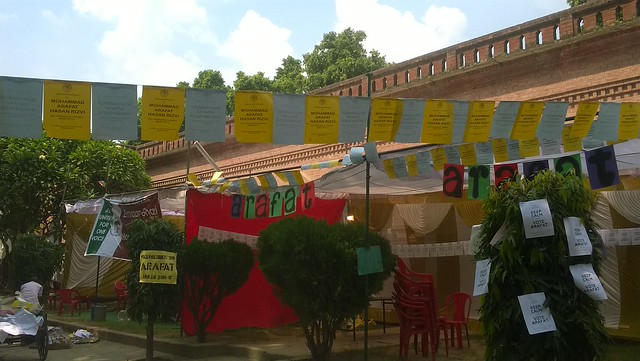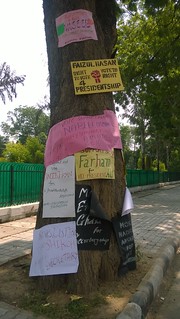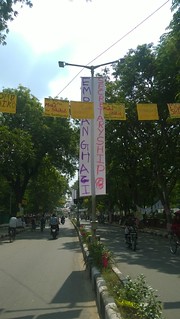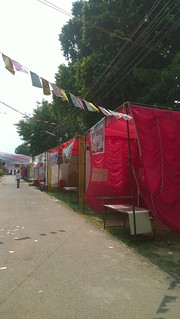By Mohammad Rafay Qadri for TwoCircles.net
In simplest terms, a Student Union is defined as an organisation of the students present in many colleges, universities, and high schools. In higher education, it is often accorded to its own building on the campus, dedicated to social, organisational activities, representation, and academic support of the membership.

(Photo credit: Mohammed Rafay Qadri)
The Aligarh Muslim University Students’ Union (AMUSU) however, seems to have developed its own broad definition of Student Union. The students of AMU can be seen swelling with pride when they talk about the past glories of AMU’s success. This university has contributed to a great extent in the formation of the academic structure of Muslims in India and ‘Aligs’ is a well-known term given to this university’s alumni. Aligs had become notable in many varied fields, both academic and otherwise, ranging from Zakir Husain, the third President of India; freedom fighter Khan Abdul Ghaffar Khan; current Vice-President of India Mohammad Hamid Ansari; Sheikh Abdullah and Mufti Mohammad Sayeed both former chief ministers of J&K and Azam Khan, the current cabinet minister in the UP government. These are among the many illustrious alumni of AMU residing all over the world. The reason for only quoting political faces of AMU lies further in this write-up.

The AMUSU elections have been rescheduled to be held on October 8, 2016. The University is witnessing an atmosphere full of loud campaigns, with every candidate confident of winning for his/her post. Speeches blaming the Vice Chancellor is the ‘Takiya Kalam’ for these aspiring candidates, often coupled with smiling faces and donning a Sherwani to ‘impress’ people. Every candidate had set up its own Tambu (Tents) and students can be seen enjoying ‘Chai and Biryani’ in exchange for votes. Besides, we can also students stopping at these tents only to eat and fly off as soon as possible.
In the midst of all this, the person who cares for the honest selection of his/her representative in the Student Union is known as ‘Softy’ and seems to have no place in the 30,000-strength of the University. This is just because this student wants to vote fairly without any force and fear of lobby and region.

“Arre ek vote ki hi to baat hai (It is a matter of just one vote). We should support our lobby otherwise in future we will not be eligible to ask them for help,” says an undergraduate first-year student when asked for whom to vote in the latest AMUSU elections.
This however, reflect the mindset of most students taking part in the elections. Universities are institutions for higher education and research: while students are here to study, the union is the tool of coordination between students and the university.

After the revolution in universities like JNU and the University of Hyderabad, it is now a suitable moment for the students of AMU to make a drastic and far-reaching change in their ways of thinking and behaving. A change, which needs the participation of students who are forced to stay quiet and those who genuinely want to participate in AMUSU but fear to ascertain a suitable platform of a skillful and effective environment in the university.
The duty also lies on the shoulders of the students to come forward and think beyond the confines of lobby, sect, region, area, etc. Regardless of electing a leader on the basis of lobby or friendship, a leader must be elected for having the qualities needed for representing the student issues. The purpose of these organisations is to represent students both within the institution and externally, including on local and national issues.
Some students’ unions are politicized bodies and often serve as a training ground for aspiring politicians. A successful union is the result of honest selection, possible only if students are aware of their favourite candidate. Awareness is spread through debates, discussion, cross-questioning, speeches and many other such creative activities, most of which are missing currently in AMU. Students’ unions generally have similar aims irrespective of the extent of politicisation, usually focusing on providing students with facilities, support, and services.
At this particular juncture, AMU needs unfeigned representatives in AMUSU. Otherwise, this minority think tank may be lost somewhere in dormant state.
The author is second year student of B.A. (Hons) Economics at the Aligarh Muslim University

